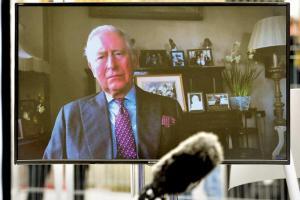Surely, as announced, the virus is novel, was never meant to be a short story! But who is surviving the lockdown best?

Prince Charles, 71, tested positive for COVID-19 last month after he had been 'displaying mild symptoms.' The prince is currently self isolating. Pic/AFP
 You can be as rich as you like; throw Gatsby-style parties on gigantic front-lawns, if you're rich and strangely generous, too. The fact is, if you're also playing host to a nikamma, novel virus called Corona, that can only luxuriate inside a carelessly hospitable human being anyway—you're instantly staring at health-scare the size of Buckingham Palace.
You can be as rich as you like; throw Gatsby-style parties on gigantic front-lawns, if you're rich and strangely generous, too. The fact is, if you're also playing host to a nikamma, novel virus called Corona, that can only luxuriate inside a carelessly hospitable human being anyway—you're instantly staring at health-scare the size of Buckingham Palace.
Doesn't matter if you're the son of the Queen of British Empire, you're certainly setting. The butler's better set than you are. Until you rise again, of course. As Prince Charles immediately did. That death/disease is the ultimate human leveler is a given. What's so special, in a once-in-a-century sort of way, that the Coronavirus may be crooning about; and that isn't so hard to get?
ADVERTISEMENT
That for once, nature has actively profiled and bizarrely discriminated against the rich (and famous)? Of all massy, non-lifestyle diseases, this is the first I know that arrived on fancy, international airlines—chilling with hosts being served hot food by an even hotter cabin crew.
Surely, I'm making this sound cooler than it is. Also don't wish to over-state the irony (or poetic justice) of Africa shutting down its borders for Europeans—being the outbreak's earliest response! While having landed through international terminals, the virus could become uninvited guest among millions in big cities, who live as working-class migrants.
They began racing towards compressing themselves into inter-state buses, and unreserved compartments of trains, heading back home. Because when businesses are shut, the lack of work in a city is a worse disease than a virus could ever spread.
How would they manage, though? No, the others didn't think of that. Because, at heart, one has submitted to the natural ability of humans to somehow 'adjust'. 'Adjust', like resilience, is that innate superpower that develops inversely proportional to one's income. Governments know this better than idiots who vote them in.
You can't expect social distancing for 50 per cent of Mumbai, when they've physically adjusted themselves to live inside each others' armpits, already. If there were six-feet distancing in slums, the last man of Mankhurd would be standing in Madh Island, and several sliding sideways to Mazagaon. What if this rich man's disease makes it to poor men's cages, and returns to haunt the posh caves again?
Again, for the first time I know, the proverbial White Town shut its doors to workers from Native Town, as a last-ditch attempt at ensuring social-distancing that would be beneficial for both. What did the well-off learn from having locked themselves inside apartments, with no "domestic help"?
With their minds casually wandering towards more existential issues, alternating between jhadu-pocha and dishwashing, surely some must've helplessly wondered about larger priorities of countries, run by humans, that had enough to make nuclear bombs, but hardly much left to build nursing homes!
While proudly Instagraming their cooking plus cleaning skills, did they also recalibrate salaries of their nannies, who perform the same tasks not only at their home, and a few others', but their own, every day?
Nope, am last the last cynic to believe that with this global pandemic shall emerge the 'post-coronial man', with a large-hearted worldview defined more by empathy, less by economics (of demand and supply).
Sure Sadhguru-type lessons on how we can afford to slow down, and share, are worth collectively pondering deeply over—now that we have time to stand and stare. Eventually would we care? There's nothing in history to support optimism. Let alone the fact that we aren't good with learning from history at all.
However, unless you've been attached to a VR set linked mentally to an outside world, you'd require perceptive skills of a turkey to not grasp, living mostly inside a single room—how little we need to survive, rather well. And not in just in terms of space; but also that. How it basically boils down to food, bed, and companionship. There is another thing equally important—art, to entertain ourselves.
Among the affluent, ones least hit by a lockdown you'll notice, are those culturally inclined. As against folk with no interests, besides in ways to make money for their employer. Which is good for capitalism, alright. But that confinement has no use for.
You can already observe people going back to watching shows from the '80s and '90s (Ramayan, Byomkesh Bakshi, etc), on Doordarshan, encouraging kids to do the same—aching/longing for times in their lives that seemed so much simpler. I, on the other hand, like many of you, can't have enough of pictures and prose, movies and shows, new and old, from across the world, on my cellphone, all through the day. A lifetime's not enough to devour.
Globalisation has caused the current, borderless problem. Globalisation is helping many deal with it. Since enough netas and news anchors asking me for strong reccos on what to catch online (yeah, right), I suggest you should have this Pakistani film on Netflix called Cake, and eat it too.
Mayank Shekhar attempts to make sense of mass culture. He tweets @mayankw14 Send your feedback to mailbag@mid-day.com
The views expressed in this column are the individual's and don't represent those of the paper
 Subscribe today by clicking the link and stay updated with the latest news!" Click here!
Subscribe today by clicking the link and stay updated with the latest news!" Click here!







